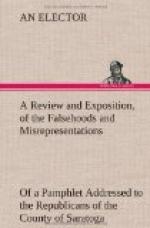“Notice—Any person that brings a recruit for the Regular or Special Reserve Branches of the Army to the Recruiting Officer at Victoria Barracks, Cork, will be paid the money reward allowed for each recruit which ranges from 1/6 to 5/- each.”
From whatever point of view we survey it we shall find that England’s Empire at bottom rests upon Ireland to make good British deficiencies. The Dominions are far off, and while they may give battleships they take men. Ireland is close at hand—she gives all and takes nothing. Men, mind, food and money—all these she has offered through the centuries, and it is upon these and the unrestricted drain of these four things from that rich mine of human fertility and wealth that the British Empire has been founded and maintained. To secure to-day the goodwill and active co-operation of the Irish race abroad as well as in Ireland, and through that goodwill to secure the alliance and support of the United States has become the guiding purpose of British statesmanship.
The Home Rule Bill of the present Liberal Government is merely the petty party expression of what all English statesmen recognize as a national need. Were the present Liberal Government thrown out to-morrow their Unionist successors would hasten to bind Ireland (and America) to them by a measure that, if necessary, would go much further. Every Unionist knows this. Ireland is always the key to the situation.
I will quote two pronouncements, one English and one American, to show that Home Rule has now become an imperial necessity for England.
Speaking in the House of Lords on the Home Rule Bill, Earl Grey, the late Governor-General of Canada, said on January 27th, 1913:
“In the interests of the Empire I feel very strongly that it is imperative that the Irish question should be settled on lines which will satisfy the sentiment of the over-sea democracies, both in our self-governing colonies and in the United States. Everyone, I think will agree that it is most important and in the highest interests of the empire that there should be the friendliest feelings of generous affection and goodwill, not only between the self-governing Dominions and the Motherland, but also between America and England.... I need not elaborate this point. We are all agreed upon it. A heavy shadow at present exists, and it arises from our treatment of Ireland.... If this be so is it not our duty to remove the obstacle that prevents that relationship with America from being that which we all desire?”
The American utterance came from one equally representative of American Imperial interests. It is that of Mr. Roosevelt, published in the Irish World of New York, Feb. 8th, 1913.
“I feel that the enactment into law of this measure ... bids fair to establish goodwill among the English-speaking peoples. This has been prevented more than by any other one thing by this unhappy feud that has raged for centuries, and the settlement of which, I most earnestly hope, and believe, will be a powerful contribution to the peace of the world, based on international justice and goodwill. I earnestly feel that the measure is as much in the interests of Great Britain as of Ireland.”




